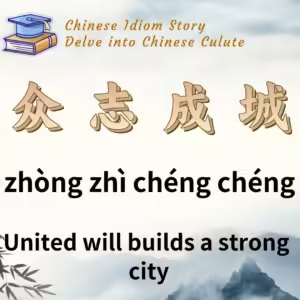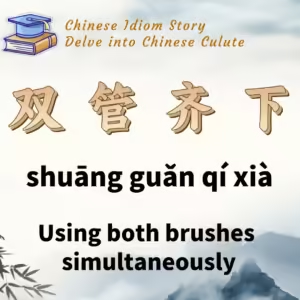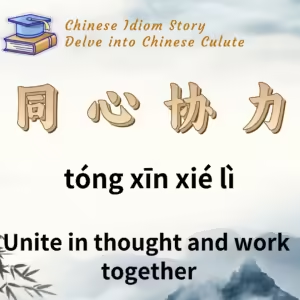
Chinese Idiom: 众志成城 (Zhong Zhi Cheng Cheng)
English Translation: United will builds a strong city
pīn yīn: zhòng zhì chéng chéng
Idiom Meaning: This idiom means that when everyone works together with a common purpose, they can accomplish anything; it also signifies the immense strength that comes from unity and collective determination.
Historical Source:《国语·周语下》 (Guo Yu, Discourses of the States).
Idiom Story:
During the late Zhou Dynasty, King Jing of Zhou was known for his indulgent lifestyle, neglecting state affairs and the suffering of his people. In 524 BC, in a bid to enrich himself further, he decided to abolish the small currency in circulation and mint a larger coin.
Shan Mu, a concerned minister, rushed to advise the king against this reckless decision, explaining that such a move would ultimately harm the common people, leading them to suffer and flee due to poverty. Despite his warnings, King Jing dismissed Shan Mu’s concerns with indifference, insisting on proceeding with his plan.
After a few years, the king sought to gather more wealth and commanded the collection of all good copper to cast two large bells, named “Wu She” and “Da Shen,” to serve as the kingdom’s largest musical instruments. Shan Mu again expressed his concerns about the potential waste and the discord it could create among the people, but the king remained obstinate.
When the bells were completed, King Jing proudly ordered them to be struck in front of Shan Mu, believing their sound was harmonious. Zhou Jiu, the official in charge of music and a friend of Shan Mu, pointedly remarked that true harmony would come from the people’s joy at the king’s decisions. He emphasized that what was needed was to earn the people’s trust and goodwill, not to impose measures they opposed.
He concluded by quoting a popular saying: “众心成城,众口铄金,” meaning that things supported by the people are as strong as a city wall, while those opposed will inevitably fail, no matter how solid they appear.
The king, feeling embarrassed and realizing the futility of his actions, understood that unity and the will of the people were crucial for a stable and prosperous reign. This story eventually gave rise to the idiom “众志成城,” emphasizing the power of collective resolve and the importance of public support.






